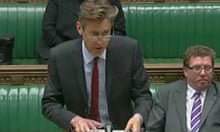When I read about Gordon Brown's plan to give the UK more broadband, I couldn't restrain my laughter. Isn't this the same clown now busy circumventing democracy to take away broadband from Britons who already have it? And what good would broadband do them if they're punished for using it (or even being suspected of using it)? Laying cables would be a waste of resources if people are not allowed to use them.
Brown did suggest another possible use for broadband. He said that it would enable MPs to better communicate with their constituents and keep track of what they want.
There is a real need to improve such communication in Britain today.
Just now, thousands of Britons are trying feverishly to tell their MPs what they want: to reject the digital economy bill. But the message is only slowly getting through. Is this due to a lack of internet bandwidth? Or might the problem be at a higher level in the political system?
If Brown's broadband plan had been carried out already, it might indeed help MPs do what their constituents want – but not the way he has in mind. More Britons with broadband could mean more Britons accustomed to filesharing, more Britons who realize that sharing is good, more Britons prepared to demand that their government serve them instead of the record companies, and more Britons supporting the Open Rights Group by telling this to their MPs now.
But you don't need broadband to communicate with your MP. If due to insufficient bandwidth you find it difficult to send your MP a video recording, you can use email, a phone call, even a paper letter if you arrange for delivery before next Tuesday. A singing telegram might make a powerful impression, but hurry before they extend the copyright on the song.
If the government were to stop slavishly obeying the record companies as it formerly obeyed George Bush, and turn its attention to the real issue – how to support the arts in the digital age without impeding sharing – there is no shortage of methods it could try. My 1992 proposal for a special tax to be distributed to artists, with the money partly shifted from the most popular ones towards those not quite so successful, is still applicable. Meanwhile, many artists support themselves already with voluntary payments by their fans. If we make it easier to send these payments, with a send-one-dollar or send-one-pound button on every player, this method would work even better. And without disconnecting anyone!
Richard Stallman is the founder of the GNU Project and Free Software Foundation



Comments (…)
Sign in or create your Guardian account to join the discussion